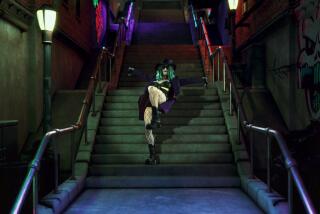Review: Park Chan-Wook’s ‘Stoker’ twists the knife on twisted tale
What would happen if a psychopath fell for a sociopath? The short answer in “Stoker” is people die. The longer answer in the new thriller from South Korean director Park Chan-Wook is a bizarrely perverse, beautifully rendered mystery that you may or may not care to solve.
It has fine performances from Mia Wasikowska, Matthew Goode and Nicole Kidman — we’ll leave you guessing who’s the more twisted of that trio. And an out-of-nowhere script from rising British-born, Brooklyn-raised actor Wentworth Miller, best known for starring in the edgy TV drama series “Prison Break.”
For Park, whose best work remains his Vengeance Trilogy, “Stoker “is an intriguing choice. (If you’ve ever wondered where Quentin Tarantino gets his inspiration, Park is on that list.) This film is more interested in the outer reaches of psychosis than brutality per se.
VIDEO: With Chan-wook Park’s ‘Stoker,’ Nicole Kidman does an about-face
The challenge with soulless characters is how to make the audience care about them. This is the film’s struggle. As it takes us into what may be the darkest coming-of-age flirtation ever, it never peers too deeply into the heart of the matter. There is no conscience really to be found, and without that, Park’s hands seem tied. But, oh, how he’s made the surface seductive.
The film opens with a series of seemingly random images: India (Wasikowska) standing on the side of a road, fields on either side, the wind teasing her dress, her hair. As India plays a piano, the melody in a minor key, a spider begins a slow climb up her leg.
Soon Miller’s debut screenplay takes a more linear and sinister turn. The film hangs on India’s 18th birthday and the death of her beloved father, Richard (Dermot Mulroney), in a particularly gruesome auto accident. The white box tied in a yellow ribbon that she finds every birthday is in a tree on the Stoker family estate. It holds a mysterious antique key.
Things begin to take shape at Richard’s funeral, and its off-kilter vibe will stay with the film. India’s mother, Evelyn (Kidman), seems to have confused funeral black with cocktail party attire. She never touches India, in fact no one does. Richard’s long-lost younger brother Charlie (Goode) has shown up unannounced. You know there was probably a reason for the brothers’ estrangement when Charlie stands at a distance watching his brother lowered into the grave.
India herself is a strange duck, dressed in a way that looks provincial — long skirts, black-and-white saddle shoes. Whether at home or at school, India doesn’t fit in, and she doesn’t care. How turning 18 will change things doesn’t seem to concern her either. Charlie does. The actress endows India with a distracted intensity and an emerging sexuality that keeps the film unsettled, and she is chillingly good at it.
If India is a bit creepy, Charlie is something else again. The temperature changes when he’s around, warmer but cooler. Gracious and attentive to the new widow, who seems as if no one has looked at her “in that way” for years, he’s something of a Gatsby-esque guy in that old money way. Though Charlie seems to be seducing the mother, he always has his eye on India and his protective instincts for his niece are to be feared.
PHOTOS: Hollywood Backlot moments
Goode has tended to play decent sorts, solid secondary roles in some excellent films — Colin Firth’s character’s handsome young lover in “A Single Man,” the best friend Jonathan Rhys Meyers’ character betrays in Woody Allen’s “Match Point.” As the worm that turns in “Stoker,” the actor proves to be quite brilliant at making your skin crawl.
Though there is violence in the film, it is less visceral than Park’s usual bloody fare. There are echoes of his earlier work, another twisted tale in the tradition of “Oldboy,” which won the coveted Grand Prix at Cannes in 2004. But the kinetic energy that usually makes Park’s films so exciting to watch has been drained away. The way in which the director framed violence and vengeance — figuratively — never left you wondering where he stood on its futility. And his imagery never left a question of what it looked like, felt like.
Park’s visual imprint in “Stoker” is even more striking, an ethereal sensibility that is hypnotic to watch. Scenes are sumptuously staged — a bed topped by India’s saddle shoes in a perfect circle from toddler sized to teen; letters she’s discovered falling like snow on a spiral staircase. Director of photography Chung-Hoon Chung, a frequent Park collaborator, and production designer Therese DePrez, whose credits range from “Hedwig and the Angry Inch” to “High Fidelity,” do extraordinary work on “Stoker.”
As the action unfolds in all that staged beauty, it’s more as if a gorgeous magazine spread with psychosexual undercurrents is slowly coming to life. Indeed a twisted sexuality is one of the film’s disturbing driving forces. It is all tangled up with the various killings, and it colors the disturbing connection between India and Charlie.
By never shedding much light on what planted the seed for the depravity of the Stoker clan, when all — or most — is finally revealed, it feels like a guest showing up too late for the party. As to what inspired the writer in the first place, I don’t think I want to know.
-------------------------------
‘Stoker’
MPAA rating: R for disturbing violent and sexual content
Running time: 1 hour, 40 minutes
Playing: ArcLight Hollywood; the Landmark, West Los Angeles
PHOTOS AND MORE
VIDEO: The making of ‘Argo,’ ‘Les Miz’ and more
ENVELOPE: The latest awards buzz
PHOTOS: NC-17 movies: Ratings explained
More to Read
Only good movies
Get the Indie Focus newsletter, Mark Olsen's weekly guide to the world of cinema.
You may occasionally receive promotional content from the Los Angeles Times.











